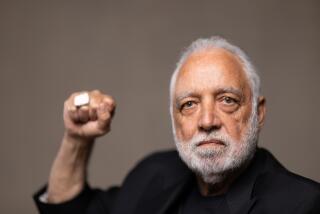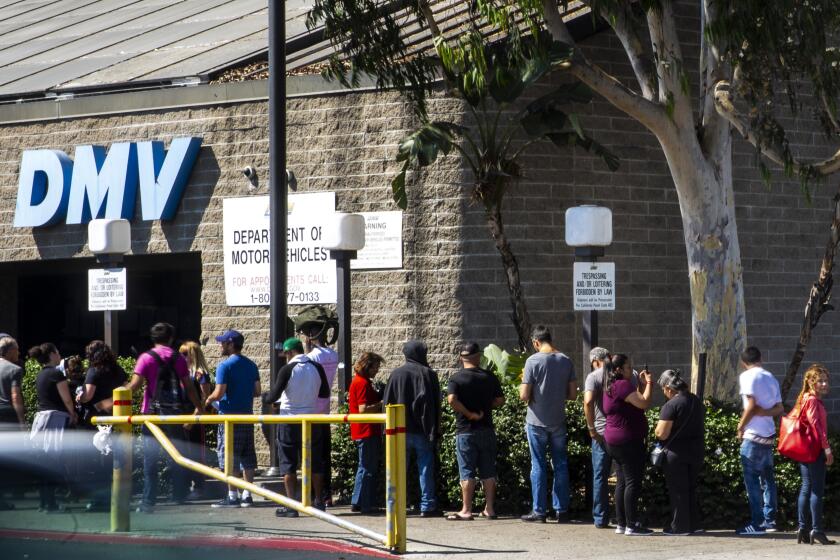Retired Los Angeles judge launches literacy project
An afternoon with retired Judge James Reese is like a living history lesson — not the textbook, milestone-studded type, but a side-splitting, mind-bending walk through time.
Reese, 92, grew up poor in Depression-era New Orleans, with a mother who cleaned houses and a mechanic father who, more often than not, drank away his $17 weekly wages.
Reese came west to escape segregation but discovered in Los Angeles that “every section of the country had its own discriminatory mores and customs.”
He was an Army lieutenant when he was turned away from the Biltmore Hotel; not even his uniform could get a colored man a room in 1942.
But this isn’t a column about race, because Reese’s life moved beyond that.
And it’s his effort to lift the next generation that drew me to his mid-city office. “Too many young black men, not much different from me, don’t have a fair chance to achieve,” he told me.
So he has donated $100,000 to USC, his law school alma mater, to provide tutors, mentors and intervention to help boys from neighborhoods near the campus.
In the current storm of million-dollar, corporate-backed school reform, Reese’s gift is like a raindrop in a hurricane. But his conviction is clear and his passion so strong, I wanted to know where that came from.
Reese spent 20 years as a judge in Los Angeles. His first assignment — 1970 in Compton — was an eye-opener, and its impact lingers.
“I had a lot of guilty pleas from 18-, 19-year-olds; young men who’d committed misdemeanors,” he said. “I tried to give them [work service] sentences with a sort of Peace Corps deal in Compton.”
But most of them bounced back to court.
“The people running the program said they couldn’t do the jobs because they couldn’t read,” he said. His voice rises as he adds, “They’d gone all through school, and they couldn’t read!”
That haunted him, but it wasn’t until he’d retired that a newspaper article pushed him to action..
“I went further on the Internet and found that officials in some states study the reading scores of fourth-grade boys in the inner city to know how many prison cells to build.”
The inference was painfully clear.
And for Reese, the solution was just as clear: Make sure those boys can read.
::
The USC-led program is still in the works; he’s leaving the details to experts. “I don’t know the educational techniques you use to teach people. I’m no authority on that,” he said. “But if you can get that little boy to look up to you and trust you, you can get him to want to read.”
He knows that because he was that little boy. He shared stories of caring teachers, a pushy big sister, a mother who put education first. And a father who would whip him if he brought home bad grades.
Reese is a nimble raconteur, with a stockpile of well-tuned stories. He peppers every tale with, “You follow me, now?” And I did … from his hooky-playing days as a kid to his graduation from McDonald 35 Colored High School to his summer job cleaning fish to earn the $60 it cost for room, board and tuition at a university up north.
He graduated from USC’s law school in 1946, the first class to attend on the GI Bill. “In our class of 33, 28 were on the GI Bill,” he recalled. “It had been passed, but not implemented. So USC didn’t get a dime … but they still treated us like family.”
Reese retired from the Superior Court bench 20 years ago but still works as a private arbitrator. He spends most mornings online — in suit and tie — at his office, day-trading Apple stock.
He’s sharp and funny, with a young wife, an iPhone and a Facebook page — though he can’t remember the last time he logged on.
And though he has his share of aches and pains, he even finds a way to laugh about that. “I used to walk to law school from my apartment at 37th and Western. Now it takes me that long to walk to the office from the parking lot.”
He’s learned as much in the last 10 years, he said, as he had in the first 82. He reeled off a string of lessons about gratitude and confidence and living in the moment.
What I kept thinking about as I drove home, though, was not his musings. It was his marriage to Desmonia Beatrice Reece.
::
He met Desi in high school and married her in 1943. “I remember a buddy of mine saying ‘She’s not the prettiest girl in the world, but she will always have your back.’ And he was right about that.”
They were as different as night and day, he said. “But we were happy together.” She died in 2008 — “one day after our 65th anniversary,” he said. Two years later, he remarried.
“I’m a man who likes to be married,” he said.
That made me think about the study now making the rounds that shows a country moving away from marriage. Just over half of Americans are married today, compared to more than three-quarters when Reese first wed.
That’s supposed to be a liberating shift: Marriage is no longer a dutiful partnership but an emotional adjunct to self-satisfaction.
Reese has a different message. He spent years presiding over divorce cases before “no fault” provisions freed us. “Back then you had to have grounds,” he said: Adultery, cruelty, desertion, neglect, habitual intemperance.
“Desi had plenty of grounds,” he said, laughing. “But she recognized and put up with them.” And when she fell ill and needed years of round-the-clock care, he made sure she had the best of everything.
“I’ve got your back” is still what matters, he said. “If you know that — and if you mean that — you can forgive and move on.”
Now, Reese is no more of a relationship guru than he is an expert in education. But he has a knack for finding common sense in the gobbledygook of problem-solving. And he knows the value of loyalty. That’s what fed his marriage, prompted his gift to USC, led him to look out for boys less fortunate than he.
So I couldn’t help asking what advice he would give a single middle-aged woman trying her hand in the relationship market.
He leaned back and looked me over.
“Don’t tell him your age, honey,” he said.
Spoken like a 92-year-old with a lot of living to do.
More to Read
Start your day right
Sign up for Essential California for news, features and recommendations from the L.A. Times and beyond in your inbox six days a week.
You may occasionally receive promotional content from the Los Angeles Times.






